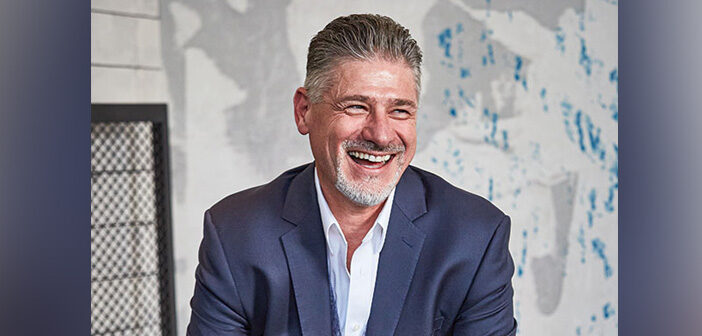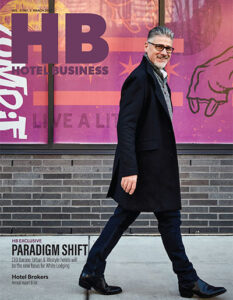White Lodging has a plan for the future. In the last few months, the 37-year-old hospitality development and management company has named a new CEO and other executives, has worked to help prepare the next generation of hospitality leaders and has revealed to Hotel Business that it is exiting its operations in suburban markets to focus exclusively on experiential urban and lifestyle hotels.
As part of that strategy, Jean-Luc Barone, CEO, hospitality management, White Lodging, revealed that the company has closed an agreement with HHM to sell 25 of its suburban management contracts. [See article for HHM President/CEO Naveen P. Kakarla’s take on the transaction.]
“We’re concentrating our portfolio on our highest value, long-term assets; and ones that we, frankly, have the most fun with,” he said. “These experiential properties also align with our strengths—from design to build, to branding, to service execution. While we’re still recovering from COVID, we have high confidence in the sustained demand for leisure, group and corporate travel in the urban markets we operate in.”
Bruce White, founder/chairman, White Lodging, added, “This strategic portfolio shift further defines our position in the industry and reinforces our focus on urban luxury and lifestyle hotels with independent destination restaurants. In a sea of commodity hotel properties and expanding management portfolios, we are positioned to create the highest level of guest experiences and an environment where associates thrive.”
The move to focus on urban and lifestyle hotels was a strategy the company adopted before the pandemic. Barone, who was promoted to the CEO role in January, said the pandemic confirmed to the company that the move was the right one. “The pandemic probably slowed us down,” he said. “My guess is that had it not been for the pandemic, where the markets for selling and buying were a little bit frozen…we probably would have divested of this portfolio sooner.”
While hotels in urban markets seemed to suffer the most during the COVID-19 pandemic, Barone is very optimistic about what the company can achieve in these markets—especially because White Lodging is privately held. “We have the luxury of being a privately held company, and I think what you’re perceiving to be happening—because of COVID—with some of our publicly traded competitors is a reaction to trying to hedge their bets,” he said. “What I mean by that is diversifying the portfolio between urban and suburban. Suburban assets have not been hit the same way as large urban assets during the pandemic. So, I think we are seeing some of those publicly traded companies making sure that they are mitigating the potential losses associated with large-scale events like COVID.”
He continued, “We’ve had the luxury to continue to execute, and we didn’t have to bifurcate during the pandemic. In fact, we’ve opened four brand new hotels in the middle of the pandemic. We never said, ‘Hey, let’s just put it on hold. Let’s just not do it or any of those things.’ We’ve just stayed the course.”
In terms of focusing on the urban and lifestyle segment, the company is putting its money where its mouth is and has more than $500 million of additional developments planned in its core markets in the next three years. “Bruce is a consummate developer…that’s all he loves to do,” said Barone. “And he just can’t wait to build the next one. Currently, we have $500 million under development already. Our strategic plan calls for at a minimum that amount on an ongoing basis.”
The company plans to have between one and three new assets “coming to life [each year],” he said. “That seems to be the right size in terms of how many we bring forward every year, what we have the capacity and the terms to support, both from a corporate oversight in opening a hotel, as well as being able to develop and train new associates to open those hotels.”
Barone said that the company has interest in a number of markets, many of which it already has a presence. “We are looking at the usual suspects where we’ve already got significant density, the Austins of the world,” he said, referring to the Texas city, a hotel market that has exploded in popularity—and one where White Lodging has had a great deal of success. “Bruce made the bet years and years ago on Austin and it turned out to be the right bet. So, we’re continuing down that path.”
Barone is excited by San Antonio, where White Lodging is already developing The Otis Hotel San Antonio. “We’ve already started demolishing an old urban resort and completely transforming it and coming to life in the spring of ’23,” he said. “We are looking at a couple more opportunities currently in San Antonio. We think San Antonio is really good and will become a very strong market, very much like Austin.”
He sees Charlotte as a growing market and the company opened its first JW Marriott there last year. “Charlotte is a place we really like, and we would like to do more deals in, so we’re certainly going to focus on that,” he said.

Barone sees Charlotte as a good market for White Lodging. The company opened the JW Marriott Charlotte there last year.
Barone also pointed to Florida and specifically Tampa, and expects more development for the company in Nashville. “We’ve got a couple of assets in Nashville,” he said. “We would like to do more deals [there]. We think it is a great city for us to do more hotels in.”
The company is being mindful of capitalizing on those markets in which it already operates, which also includes Indianapolis, Louisville, Chicago and Denver. “We think that scale matters,” said Barone. “When we get into a market and when we have a multitude of hotels across different brands, it gives us insights that some of our competitors can’t get. We have a really good sense of what the market demand looks like across a diverse portfolio of brands and even within the hotel bands.”
Having numerous hotels in one market has major advantages. “We have 12 hotels in a city like Austin,” he said. “It’s really hard for us not to know everything about Austin because if one hotel doesn’t know everything, the other one will know some pieces of it, etc. And when we collate all of that, it is like a puzzle—because of the density, we collect all the pieces of that puzzle and we’re able to make the right decision.”

The Marriott Austin Downtown is one of the 12 hotels the company has in the Texas city, one of White Lodging’s most successful markets
Having multiple properties also affords the company an advantage when it comes to the current labor shortages. “It is probably the single most difficult and most salient pain point in our industry,” said Barone. “Being able to have that density allows us to offer a career path to the next generation of hoteliers that many of our competitors can’t do. It allows us to chart a path for some of those young leaders. We can show you a flowchart of career progression…and you’re always going to have an opportunity.’”
White Lodging’s strategy also includes “significant investment” in revising its training, development and mentorship programs to better align with a modern post-pandemic workforce dominated by Millennials and Generation Z. “One of the things that we are hyper-focused on is the partnership with the local community and colleges, particularly Purdue University,” he said. “We have a greater affinity to Purdue because of the proximity to [our]headquarters…and the fact that our chairman is a graduate.”
In October, the university renamed its School of Hospitality and Tourism Management to the White Lodging – J.W. Marriott Jr. School of Hospitality and Tourism Management, in honor of the White family’s financial and in-kind support of the school. At the request of Bruce White, the name also honors the career and contributions of J.W. “Bill” Marriott Jr., the retiring Marriott International executive chairman.

The company partners with Purdue University’s White Lodging-J.W. Marriott Jr. School of Hospitality and Tourism Management on the Union Club Hotel at Purdue University, an Autograph Collection Hotel, in West Lafayette, IN. The hotel is entirely student-run.
“We have the first and only Autograph Hotel that is student-run in the world,” said Barone. “We also have the LAUNCH Hospitality Immersion Program for select students.”
The program provides a paid, hands-on experience across all hotel and restaurant operational areas for select Purdue students. It comprises three, year-long phases and helps students define and refine their preferred focus area, training and experiences within the industry.
“The idea is that by the time they complete the program, they get an offer to be a manager with White Lodging in one of our locations,” said Barone. “We think that growing our talent internally is probably the key to continued and enhanced success over time, rather than drafting so to speak. It’s homegrown talent that understands our culture better. The ramp in terms of how fast they can become very proficient is much faster, but more importantly, it should significantly slow down and/or mitigate turnover, which is a big problem in the industry today because they understand how we work they understand our systems already.”
Once those leaders—and all employees—are brought on board, the company is working to keep them. “The big focus for the next two years is really building an environment where employees and associates can thrive in our system,” said Barone. “We appreciate that today people have choices. What we’re trying to do is create that environment where people feel so at home with White Lodging so that they understand they can be their very best in the environment we’ve created.”
He continued, “It comes in a variety of ways—everything from your first day of orientation to the whole onboarding process, the quality of the training that we’re dispensing, the certification, the communication and setting clear expectations. We understand at a high level what needs to happen, I think the consistency of execution determines if you’re really good at it, and the companies that figure and crack that code will be the most successful.”


